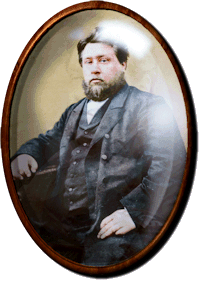Your weekly dose of Spurgeonposted by Phil JohnsonThe PyroManiacs devote some space each weekend to highlights from The Spurgeon Archive. For Easter weekend, we're featuring a complete sermon, "Belief in the Resurrection." This message was first preached in a midweek service on Thursday evening, 15 September 1870.
 "He is risen."—Mark 16:6.
"He is risen."—Mark 16:6. UR Lord always told
UR Lord always told his disciples that he would rise. They were astonished to hear that he would die at all: they could not think it possible that he could die by the terrible death which he often hinted at. Had they understood and really believed that he would rise again, they might not have been so surprised at his death, but often as he spoke of it, their minds seemed to have been like their eyes on some occasions, holden that they should not see, and if they perceived his meaning, it ran so contrary to all their ideas of a kingdom for a Messiah, that they could not somehow grasp it as a reality.
Now one of the first things that strikes the reader of the chapter before us shall furnish us with our first head of contemplation tonight:—
I.THE ALMOST UNIVERSAL POWER OF UNBELIEF IN THE CHURCH.This is a good instance to illustrate a general fact, for our Savior had to their ears in plain terms told them he would rise again. Yet on the third day not one that we know of expected him to rise. When they were informed that he had risen, by eye-witnesses, by persons whom they had been accustomed to treat as deserving of all credence, persons with whom they had been long acquainted, they, everyone of them, were incredulous: they could not believe it, though it were testified to them again and again. As you read this chapter through, you meet with first one instance and then another of this general incredulity about a thing on which all ought to have been sound believers. You find, first, the women—very tender, very loving, always accustomed to minister to Christ's necessities in the days of his flesh: now their very love leads them to an unbelieving act.
If he be risen, and he said he would rise,what need of grave-cloths, what need of precious ointments, and spikenard, and spice, in which to embalm him? 'Twas love that said "Embalm him," but 'twas unbelieving love that made them think the thing was necessary to be done. All through those tender hearts, wherein so much of heavenly ardor for Christ was found, there was also found this leaven of mischief.
But the men, the strong sex, will not they also, their hearts being full of love, and having walked with Christ, having strong judgments many of them, having noticed and weighed what he said, will not they believe? No! Peter and John, though they come to the sepulcher come there with heavy hearts, evidently with no expectation such as would have been excited by the belief that Christ had risen. The whole brotherhood of the disciples appear to have gone altogether over to an unbelief of the thought that Jesus Christ would rise.
But there were some favored ones—there were the eleven. These were the elect out of the elect, the spiritual lifeguard, the very bodyguard of the Savior. Surely, if faith be extinct everywhere else, we shall find it in them. They were in the garden at his passion, some of them were on Tabor at his transfiguration, three of them, at any rate, were in the chamber where he raised the dead. They had seen his miracles, they had themselves distributed the bread which by a miraculous power he had multiplied for the feeding of the multitude. They had seen him walk the sea—one of them had himself trodden on the liquid wave, and found it marble beneath his feet when Christ had bidden him come. They had marked the tempest hushed, they had seen devils expelled, many marvellous displays of divine power had they all of them beheld. These choice ones, especially those three mighty, those chosen three, would believe! Yet they also were tinctured with this same evil; they had not such a faith in their Master as they should have had.
And now this was but, I think, a portrait of what has been ever since the great mischief in the Church of God. This sin of sins—unbelief—is still at this very hour too common among the people of God. Suppose I talk to the mass of God's people, the quiet, humble people, who go about their business and serve God in their households. Shall I find them all full of faith, giving glory to God? No, I am not long with some of them but I hear their doubts as to whether they are his or not. I hear some of them singing:—
"Do I love the Lord or no;
Am I his, or am I not?"
True, I see many of them happy and joyful, contented and trustful, but not
always so, even they. Sometimes even these seem to give way to fears and suspicions, and they half think that he has forgotten to be gracious—will be mindful of them no more. Truly is it written, "If the Son of man cometh, shall he find faith upon the earth?" He may look for it, and look for it long, for amongst his own believing people. Yet is faith all too rare a thing—hard to be discovered. It is true it is in its essence always in the Church, but yet so feeble that oftentimes the fire is rather that which trembles in the smoking flax, and almost expires, than the spark that seeks the sun, the Father, the flame from which at first it came.
Now suppose I turn away from the mass of Christians, and select for myself those that take office in Christ's Church, appointed by him, gifted, and given, as the result of the ascension, to the Church as the Church's treasure. My brethren, what shall I say about deacons, elders, and such like in the Church of God? How find I you? Do I not discover oftentimes in church officers a slackness of enterprise, a fear lest this should be too great a thing or that too venturesome? Have I not heard—though certainly I may say I have not experienced have I not heard that sometimes those that should lead the Church have held her back, and those that should be first and foremost to sustain the Christian ministry in every holy effort, have they not been sometimes a very drag upon the wheels to hinder it? And if it be so in their official acting, I fear it is not much better in their own private capacity before God. Alas! O Israel, thy captains are weak; thy mighty men tremble.
But suppose I select those God has especially favored and made the winners of souls. Do I find these at all times confident in the God whose gospel they proclaim? Are they always calmly reliant, upon that eternal power which has ordained them to their work? We must, each man, speak for himself; but I fear the most of us might take up a wailing for ourselves, and confess that we also too often must say, "Lord, I believe; help thou mine unbelief."
The prayer of the apostles is a suitable prayer for ministers, "Lord increase our faith" For, if
our faith be not increased, we cannot expect that the faith of the multitude will be. Christ's ministers ought to be to Christ's army a sort of spiritual
Uhlans, that ride on ahead to investigate the country, to take hold of it before the main body comes up. They should be the men to lead the forlorn hope; they should be first in the trench whenever a citadel is to be taken by storm. Their hearts should never fail them; they should be men of large conceptions and bold designs: men to fall back upon the Infinite, and rely upon the unseen. Are we always such, or such to such a degree as we ought to be? No, I fear that the chapter church history which is being now written is, in the sight of God, much blotted by the unbelief of all his people. Faith there is—I bless God for it—and in some cases very eminent faith; but taking us all round, alas! we must make up a sorrowful confession of our shortcomings in the matter of our faith in the living God.
Now, turning to the chapter again, we shall get our second point of consideration:—
II. THE GREAT CURE WHICH OUR LORD PRESCRIBED FOR THE MATTER OF UNBELIEF.As far as this chapter goes, it lies in the fact that he is risen He is risen from the dead. You will observe everywhere here, where we meet with the unbelief of man, we meet with the fact of the resurrection of Christ brought in like light to subdue the darkness.
Here are the women in
difficulties: it is the resurrection of Christ that removes the difficulty. Who shall roll us away the stone? The stone is rolled away because Christ is risen. The angel has taken away the stone door of the prison house because it was time that the captive should go free.
Now here the Lord seems to tell us that the best and grandest cure of all our fear about difficulty lies in this, "The Lord is risen." You serve a living Savior. What is the difficulty? Is it a providential one? the is the Master of providence, for "the government shall be upon his shoulders, and his name shall be called Wonderful, the Counsellor, the Mighty God." That difficulty, then, which would obstruct you in your pathway to heaven, if you trust in him, must vanish because Jesus lives. If the Captain of the host were dead, it would be an ill thing for us to be serving a dead Captain, but since he lives, girt with omnipotence, difficulties must vanish before him.
Does it happen that the difficulty which troubles us is one concerning our Service to our Lord? Have we a hard heart to deal with in the child whose conversion we seek, in our class, in the Sabbath School, or have we prejudices that stop our way in the congregation that we address week by week, and that he hope to convert to Jesus by his Spirit? Are we called to plough an unthankful soil that breaks the ploughshare, Is there something just now before us that looks like a gate of brass and a wall of iron? Here is the one comfort concerning it all: The Lord liveth. "He is not here; he is risen." He is not dead; his power lies not paralysed in the tomb; he lives and goes before you, leading the van of all the noble, of those who died for his crown and glory. On with you, then, in the name of God! Be this your might that Jesus lives. Henceforth, let difficulties be only rejoiced in as things to be over come, as opportunities for glorifying him by the exercise of your faith in him, which will be followed by the revelation of his power. So, then, that vanishes.
If unbelief raises difficulties, "The Lord is risen" is the cure for them all.
Suppose our unbelief takes the shape of
fright. It does sometimes. It did in the case of these good women—they were affrighted, we are told in the fifth verse. We are told again in the eighth verse that they fled from the sepulchre, for they trembled. Now we may be frightened at a great many things. Some persons are so timid that they are frightened at nothing: their own shadow will frighten them.
But there may be real matters that should cause us to tremble if we had not something better to fall back upon than ourselves. Now a Christian in a fright is like a man out of his wits. He is pretty sure to do something that will make his danger greater. Self-possession, calm composure, a quiet mind, these have often saved lives, have frequently prevented the destruction of a cause that was just then in peril. If thou canst be calm amidst bewildering circumstances, confident of victory in the end, that will half win the battle itself. If thou canst rest in the Lord. or, to use the words of Moses, "stand still and see the salvation of God," thou wilt surely come out unscathed the evil.
Now the best cure for fright is the fact that Jesus is risen. Why, how am I to be afraid when he who is King of Kings and Lord of Lords is my shepherd, and will surely interpose for my protection? If my Lord were dead, then were I unsafe, but while Jesus lives I am secure.
"Because I live, ye shall live also." Oh! what a grand sentence is that! "I give unto My sheep eternal life, and they shall never perish, neither shall any pluck them out of my hand." Who art thou, then, that thou shouldest be afraid of a man that shall die, and of the son of man that is but as the moth? Rest thou in thy living Savior "Fear not; I am with thee—I am with thee—be not dismayed, for I am thy God." "I will strengthen thee; yea, I will help thee; I will uphold thee with the right hand of my righteousness. When thou passest through the rivers, I will be with thee; the floods shall not overflow thee. When thou goest through the fire, thou shalt not he burned, neither shall the flange kindle upon thee." "I am God, I change not; therefore, ye sons of Jacob are not consumed."
Come back, then, if you are tempest-tossed, terrified, trembling, and affrighted, and, because Jesus lives, be quiet, and in patience possess your souls.
I notice in the chapter that the next form of unbelief is
amazement. These good women, in addition to being afraid, were amazed—could not make it out. It was too great a mystery. How could it be? It troubled them—it
troubled them.
Now in all times of our amazement about great gospel truths, we shall find always the best way to get out of the amazement is to hold fast by faith to the veracity and truthfulness of God, and to hold fast to what we can understand—to a fact that has been proved better than other facts of history have been proved, the fact that the Lord Jesus is risen from the dead.
It is generally when you are in trouble about some great doctrine a
bad thing to argue about that doctrine while you are troubled about it. Think more of what you
do believe, of what you are sure of, than just now of that matter which staggers you. You will find that, if you receive the resurrection of Jesus Christ from the dead, and rest in that as being a guarantee of your resurrection, you have the key of many other precious truths; and as one doctrine draws on another as the links of a chain, you will find your amazement at some of the most stupendous mysteries of the faith will be cured by your grasping the first simplicity and fundamental doctrine of the faith of the gospel, that the Lord Jesus, who suffered under Pontius Pilate, was crucified, and dead, and buried, and the third day rose again in very flesh and blood. and ever liveth, sitting on the right hand of God, reigning in exceeding power.
You will not be amazed nor affrighted; you will not be made to tremble, or be bewildered, if you keep close to this—"He lives! He lives! This I know, and on this I rest."
Further, it seems that these good women were much
prevented in doing their duty by their unbelief. They were told to go and speak to the disciples, but, at any rate for a time, they did not do so, for it is written, "Neither said they anything to any man, for they were afraid." Those tongues that by-and-bye in calmer moments would bear such a sure testimony were, through their fears which sprang of their unbelief, quite dumb. They could not speak.
Oh! and this is a complaint that is very common in the Church. I know some that could preach, but do not, and it is
unbelief that silences them. And you today, perhaps, were in society where you ought to have spoken a loving and an earnest word, and you did not, and it was a wrong timidity that kept you quiet. And you have been many times in your life cast into positions where usefulness would have been very easy, but at the same time you found it hard, because you forgot that Jesus lives—you forgot that he lives to watch his people, lives to render them assistance when they are in the path of service.
Oh! if we knew he lived—aye! knew that he was here—knew that he was close to us, and that his heart never forgot us, and his eye was never closed upon us—we should be swift in the ways of duty, and a stammering tongue would begin to speak; and the now unhallowed silence which spoils the Church? and robs her of many a triumph, would be broken by our willing testimony. and by our cheerful song. The best cure? for the dumb devil that sometimes, possesses us is a belief in the living and pleading Savior.
Further on, as your eye glances down the chapter, you will see unbelief connecting itself with
wounded affection. When Mary Magdalene came to the disciples, she found them weeping, weeping for sorrow, men and women of God? a very mournful company, all weeping, weeping for a dead Savior—the dearest friend they had ever had, who first had given them spiritual conceptions and lifted them out off their former grovelling state. He was gone: he was dead, and they could not but weep. But they left off weeping, or would have done if they had known or believed that. He was risen.
It was the last thing they should have done, to be weeping. He rising, and they weeping! All the harps of heaven ringing out melodious praise, and those most concerned in the glorious fact still weeping! Every angel in heaven bending from the sacred battlements to look down upon a risen Savior with admiring gaze, and yet his own dear people who had known and loved him, sitting down and weeping amidst the universal festival! It was very strange.
Now oftentimes the same mischief happens to us. We lose a friend. Who among us has not? We lose a husband, a wife, a child. Very dear are these associations; and when the ties are snapped our heart bleeds, and sometimes we weep, and weep, and weep again until there is a want of submission to the Savior's will, there is a want of resignation to his divine purpose and decree. Now if we recollected that he lives we should also remember that they also that sleep in Jesus shall God bring with him: for if Jesus rose from the dead, so must all his people.
We sorrow not as those without hope; we commit our precious dust to the earth, but it is only far a while. We lay it low, but we thank God it can go no lower. Corruption shall not consume, but refine this flesh until, when the trumpet sounds, the very body that we wept over shall rise again in sacred lustre, fashioned in the image of Christ's own glorious body. Death is robbed of all its sting when we remember this—the soul in the company of the living Savior; the body, like Esther, bathing itself in spices to make it ready for the embrace of the all-glorious Lord; the old, worn-out vesture laid aside awhile, until God refits it, and makes it fit to be worn in the high festivals of heaven.
Oh! if Jesus lives, we wipe away the tear, and we carry not our dead to their graves with sound of weeping and with the noise of lamentation, but with the sound of holy psalm and shoutings of victory; we lower the conquering champion into his rest in sure and certain hope that he shall rive to participate in his great Captain's everlasting, victory. "Christ is risen" is the cure for wounded affection, when the wound rankles through unbelief.
Further, remark that this blessed doctrine, that Christ is risen cures us of the difficulties we have as to
intercourse with heavenly things. It is earlier in the chapter, though I mention it last. The angel appeared unto the women—two angels appeared to certain other women, according to Luke, and instead of speaking to the angels, they ran away. They were afraid and amazed. "Fear not ye," said tile angels, "for we know that ye seek Jesus, which was crucified. He is not here, for he is risen."
Now I think if you and I were in a state of full faith in the risen Savior, if we met an angel, we should not be amazed. If we saw an angel—if once again the spirits could put on the semblance of bodies and soon appear to the organs of our vision I think if we revere full of faith, we should avail ourselves of the opportunity to learn some thing about them, and about the heaven they dwell in, and, most of all, about their Lord.
Oh! methinks I would like an hour with some bright spirit to question him about some of those mysteries that, as yet, eye hath not seen. If it were lawful for him to utter what, perhaps, he might not tell—if it were lawful for him to tell of some of the glories within the veil, and some of the mysteries of those streets of gold, and those walls of twelve foundations calf precious stones, our inquisitiveness might take a holy turn. Act any rate, if we might not ask questions, we would hold fellowship; we would be glad to see these spirits that are so near akin to us, for even now—even we—we are not strangers to them. They bear us up in their hands lest we clash our foot against a stone, and we are come to the general assembly and Church of the firstborn—we are come to the host of angels, and to those whose names are written in heaven: we are come to that innumerable company, even now, by faith, and if we could get a glimpse of them, we should not be afraid.
Now it is a fact that Christ is risen that makes an open door between us and the spiritual world. A man in flesh and blood is gone into the skies: a man who ate a piece of a broiled fish, and of a honeycomb—a man that said, "Handle me and see that it is I myself ": a man of whom it is written, "He showed them his hands and his side": a man who said to one of his acquaintance, "Reach hither thy finger behold my hand, and reach hither thy hand and thrust it into my side"—such a man is gone into the excellent glory, and he has opened a living way by which our intercourse with angels, and with the angels' Master, is complete.
Oh! herein there is subject for spiritual minds greatly to rejoice at, and the difficulties which unbelief would put in our way are swept away by the full conviction that the Lord is risen—is risen indeed.
But I must not dwell longer on that. The great power of unbelief receives its antidote in the blessed and well-ascertained fact that Jesus is risen. Now let us see still further:—
III.SOME OTHER CONSEQUENCES OF OUR LORD'S RISING.We observe in the chapter that one of the first consequences of his rising was a more general, a more intense, a more universal activity in the Church. He said to them, "Go ye into all the world and preach the gospel to every creature." We see again, "He was received up into heaven, and sat on the right hand of God, and they went forth and preached everywhere, the Lord working with them." From which I gather that, if we did more fully perceive that Christ is risen, we should be all of us more active.
It is very hard to get up enthusiasm for an idea—certainly in England it is—it may not be in some more mercurial clime among a more sensitive and responsive people—but here we do not generally get into a state of enthusiasm for an idea. But what men are there that are not moved to enthusiasm for a
person? A man, a person, will always command more fully the activity of human hearts than will a mere doctrine or dogma.
Bring before me in history the leading principles, and you will generally find that the principles did little or nothing until they wore embodied in a man, and when some bold man represented the principles, then the principles opened the man's way to human hearts. It is so in the Church. I suppose some people are enthusiastic about creeds and about dogmas. I don't know, but I know this: that the most enthusiastic people in all the Church are those that know him, and love him, and live with him, and serve him. The enthusiasm of heaven seems to be about them. They cast their crowns at his feet, and they sing "Hallelujah" when they behold God and the Lamb. There is an adoration of persons, and their souls are moved by the presence of blessed and divine persons, and so in the Church should it be. We have a living Savior, a living Captain. He is not out of the fight: he still looks down upon us: he still is fighting with us in the grand old cause.
Oh! who of us will be a laggard when the Captain's eye is upon him? Jesus is looking on—Jesus, the author and the finisher of our faith, is looking on the course. Let us run with patience, because we look at, and are looked upon by, him. May this principle of Christian patience move every person here to do something, and continue to do something for the honor and glory of his Master.
But, in addition to this cause, we find that the presence of Christ gave to the church at that time miracles. The risen Savior endowed them with unknown tongues, and they spoke, though they were uninstructed men, so that men understand them from every clime: they began to work wonders.
Our faith leads us not to these,
nor will it. This is wisely denied us. At the same time, though we work not miracles in the outer world, all true preaching is miracle working. Commonly to declare a doctrine, commonly to speak a thing well—all this may be no preaching as God would call it—eloquence, oratory, refinement, the putting of words well together—this is common to all mankind. After their measure, all may speak—after some sort. This is not God's work; but true preaching, soul-saving preaching, the Spirit's voice speaking through man—this is miracle working.
You know, my brethren, there are some who cannot preach—they say they cannot preach the gospel. I mean this: they will preach sermons to God's living people, to God's quickened ones, and then they say, "As for you that are dead in sin, I have nothing, to say to you." That is their notion. They are very candid. God never set them to preach the gospel, and they own they cannot do it. Well, a pity that they should try; but another man whom God sends knows, as the other did, that the hearer who is unconverted is dead in trespasses and sins. He knows that ordinarily to speak to such people would be a very idle thing. He knows he dare not attempt it in his own strength, and that to say to the dead, to the spiritual dead, "Live," is in itself the extreme of folly. But he, feels that God is with him, that God has sent him, and looking, like Ezekiel of old, upon the congregation of sinners, as in the valley full of dry bones, he does not say, "I have nothing to say to you; you are dead"; but bursting out in his Master's name, he says, 'Ye dry bones, hear the Word of the Lord. Thus saith the Lord, ye dry bones, 'Live.'" God sent the man, and while he prophesies thus upon the bones, they come together, bone to his bone, and live.
The two apostles at the beautiful gate of the temple did not say to the lame man. "You are lame; we trust in God's time you will get cured of your lament—we have nothing to say to you"; but they said, "In the name of Jesus of Nazareth, rise up and walk." They bid the man do what he could not do, but as they bade him do it, the strength came to him to do it. And while we say to the sinner, "Believe and live," God sends the power of the gospel command, and they do repent, do believe, do live, do fly for refuge to the hope set before them in the gospel; and to this day each Christian is a miracle worker in his own sphere, in the sphere of spiritual things. He opens blind eyes by God's power, and unstops deaf ears by Jesus' might. He, too, raises the dead; he, too, casts out devils, still in the higher realm, the realm of mind, the realm of spirit; and our ascended Lord has given us this—this power—we receive it entirely from him because all power is given unto him in heaven and in earth. Therefore, go we and teach all nations, and that teaching works results.
I must not detain you longer, except to notice that, in consequence of our Lord's resurrection, there is divine power, the highest degree of power concentrated in the person of Jesus Christ. He was ever God, and now as God—man Mediator all power is concentrated in him. And this power is not laid up there to be idle—not as so much stored up ammunition never to be expended, for if you notice the last verse, "The Lord working with them."
Is it not a delightful thought that Jesus is not a sufferer, but he is a worker still?" The Lord working with them. "Redeeming work is done; saving work is going on. "The Lord is working with them." We do not see it, but he is working. Often that power which is least seen is most mighty, and certainly in the Church that which is not perceptible by the senses is the strongest power.
Believer, if the conversion of the world rested with the Church, if the outgathering of the elect depended upon us, it never would be done; but God makes us work for this end, and so he works first in us, and then he works with us. How this ought to encourage us to work! This little arm, what can it do? But that eternal arm, what can it not do? This tongue, how feebly can it speak; but the voice of him who spake as never man spake, how persuasively can it speak? Our spirits, narrow and limited, what can they effect? But his unbounded Spirit, what cannot he perform?
Oh! let everyone here who has been serving his Master bid farewell to everything like a discouraging or desponding thought. The great army of God is not defeated; it never can be, in the long run it must conquer. And even those parts of the divine strategy of our great Commander. which looked like retreat, are only portions of his perpetual victory. He is fighting on, and will win the battle, even to the end. It is a great consolation to the believer to know that Jesus lives, and lives in triumph.
I do remember, and I cannot help repeating what I have told you before—I do remember, when in an hour of the most overwheming sorrow through which a mind could pass, this one thing restored and comforted me. After
that dreadful catastrophe in the Surrey Gardens, when my mind gave way, and my sorrow was extreme—when I had almost lost my reason for some three weeks, and was desponding and brokenhearted, I was alone, walking in solitude, mourning, and weeping as I did day and night and on a sudden there came into my mind, as though it dropped from heaven, this text, "Him hath God highly exalted and given him a name which is above every name that at the name of Jesus every knee should bow"; you know the rest. The thought that crossed my mind was this, I am one of his soldiers, and I am lying in a ditch to die. It does not matter: the King has won the victory—Christ has won the victory—Christ is to the fore. If I die like a dog, I care not. The crown is on his head. He is safely exalted."
In a moment I was happy; my trouble was gone; I found myself perfectly restored; I fell on my knees in a solitary place, praising God who, in infinite mercy, had made that text to be a balm to my spirit. Now there may be someone here who feels much as I did—disconsolate, cast down If you really love Jesus, there is not a nobler balm for your care than this: he reigns, he is glorious; the government is not taken from his shoulders. Our King is no captive; our Emperor has not yielded up his sword: our Prince Imperial is not banished: our Empire never fails, the city of Jerusalem is not besieged: there shall be no straitness of bread in her streets. "God is in the midst of her: she shall not be moved; God shall help her, and that right early."
Let the heathen rage: let the people and nations be moved: let the whole earth rock and reel, and the mountains be carried into the midst of the sea, God is our refuge and strength, our very present help in time of trouble. God reigneth, and the kingdom of Jesus is settled by an unchangeable decree. Therefore. lift up your heads, ye saints, for your redemption draweth nigh, and even now clap ye your joyful hands, and go ye back again to the conflict of life until your Master galls you home like true heroes, that henceforth shall know no fear, and shall never turn your backs in the day of battle.
God grant it may be so for his name's sake. Amen.
 t one point in Huckleberry Finn, Huck's raft is smashed by a riverboat (or so he thinks), and he swims ashore. He ends up being taken in by a family named Grangerford. He lives with them for an extended time in a small community that is dominated by a 30-year-old feud between the Grangerfords and Shepherdsons.
t one point in Huckleberry Finn, Huck's raft is smashed by a riverboat (or so he thinks), and he swims ashore. He ends up being taken in by a family named Grangerford. He lives with them for an extended time in a small community that is dominated by a 30-year-old feud between the Grangerfords and Shepherdsons.  No one remembers what the fight is about or who started it, but both clans are fully committed to perpetuating the feud. As far as Grangerfords are concerned, Shepherdsons are good only for one thing: killin'. And vice versa. Age and gender are no matter.
No one remembers what the fight is about or who started it, but both clans are fully committed to perpetuating the feud. As far as Grangerfords are concerned, Shepherdsons are good only for one thing: killin'. And vice versa. Age and gender are no matter.










 was writing something to agree with and embellish
was writing something to agree with and embellish  One of the unintended side effects of Tim's post has been a widespread and sometimes lively discussion about whether
One of the unintended side effects of Tim's post has been a widespread and sometimes lively discussion about whether 

 But the mentality that dominates the evangelical culture today—and the far greater problem, in my judgment—is exactly the opposite. The overwhelming majority of today's evangelical sophisticates would clearly prefer it if no one ever criticized evangelical Golden Calves. Rampant error doesn't unsettle them in the least. They are quite happy to live with it and even actively make peace with it.
But the mentality that dominates the evangelical culture today—and the far greater problem, in my judgment—is exactly the opposite. The overwhelming majority of today's evangelical sophisticates would clearly prefer it if no one ever criticized evangelical Golden Calves. Rampant error doesn't unsettle them in the least. They are quite happy to live with it and even actively make peace with it. or your further reading pleasure, The Greatest Single Comment Ever Left on Our Blog:
or your further reading pleasure, The Greatest Single Comment Ever Left on Our Blog: What can I do now that my church is foundering?
What can I do now that my church is foundering?





 ere's eighty-eight minutes of video that is at various times stupefying, thrilling, maddening, amusing, and intriguing. And that's just the opening statements. The key players on this video (in roughly the same order as those adjectives) are Tony Jones, Kevin DeYoung, Scot McKnight, and Brett-and-Alex Harris (Josh's younger twin brothers, barely out of their teens and highly likeable). They're all discussing and debating the Emergent/ing Church Movement. This is a panel discussion that took place two weeks ago at the
ere's eighty-eight minutes of video that is at various times stupefying, thrilling, maddening, amusing, and intriguing. And that's just the opening statements. The key players on this video (in roughly the same order as those adjectives) are Tony Jones, Kevin DeYoung, Scot McKnight, and Brett-and-Alex Harris (Josh's younger twin brothers, barely out of their teens and highly likeable). They're all discussing and debating the Emergent/ing Church Movement. This is a panel discussion that took place two weeks ago at the  Tony Jones (he of the "chastened epistemology") cracked me up with his bold (and visibly irritable) insistence that "I absolutely know Augustine." It turns out he "absolutely" knows the Reformers, too, and Pilgrims Progress. (He wrote annotations for an edition of Bunyan's allegory, you see.) He made this stunning declaration about his absolute knowledge of church history immediately after saying that until "a couple of years ago" he never even heard of anyone who believed that Scripture has a "plain meaning." Somehow, Jones gained his uncanny knowledge of Bunyan and the Reformers while remaining blissfully unaware that they all believed in the perspicuity of Scripture. Hmmm. Worse yet, Jones is basically denying that Scripture is capable of being known as thoroughly as he knows Augustine and the Reformers. Arrrrgh. (Epistemological humility turns out to be a really hard position to maintain when people keep pointing out that your arguments are full of holes.)
Tony Jones (he of the "chastened epistemology") cracked me up with his bold (and visibly irritable) insistence that "I absolutely know Augustine." It turns out he "absolutely" knows the Reformers, too, and Pilgrims Progress. (He wrote annotations for an edition of Bunyan's allegory, you see.) He made this stunning declaration about his absolute knowledge of church history immediately after saying that until "a couple of years ago" he never even heard of anyone who believed that Scripture has a "plain meaning." Somehow, Jones gained his uncanny knowledge of Bunyan and the Reformers while remaining blissfully unaware that they all believed in the perspicuity of Scripture. Hmmm. Worse yet, Jones is basically denying that Scripture is capable of being known as thoroughly as he knows Augustine and the Reformers. Arrrrgh. (Epistemological humility turns out to be a really hard position to maintain when people keep pointing out that your arguments are full of holes.)

 e find the apostle Paul putting Christ's obedience in contrast to the disobedience of Adam: "As by one man's disobedience many were made sinners, so by the obedience of one shall many he made righteous." Now this is not Christ's death merely, but Christ's active obedience, which is here meant, and it is by this that we are made righteous. Beloved, you need not sing with stammering tongues that blessed verse of our hymn,
e find the apostle Paul putting Christ's obedience in contrast to the disobedience of Adam: "As by one man's disobedience many were made sinners, so by the obedience of one shall many he made righteous." Now this is not Christ's death merely, but Christ's active obedience, which is here meant, and it is by this that we are made righteous. Beloved, you need not sing with stammering tongues that blessed verse of our hymn,





















